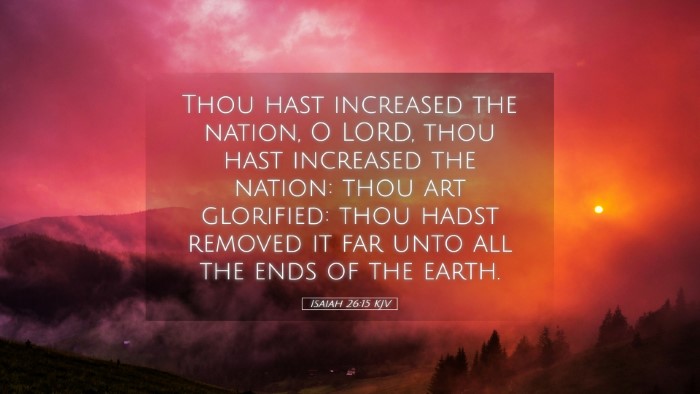Isaiah 26:15 - Commentary Summary
The verse Isaiah 26:15 states: "Thou hast increased the nation, O Lord, thou hast increased the nation: thou art glorified: thou hast removed it far unto all the ends of the earth." This passage reflects a profound recognition of God's sovereignty in the growth and flourishing of His people. Below is a summarized commentary on this verse that integrates insights from renowned public domain commentators.
Contextual Background
The book of Isaiah is a richly prophetic text that addresses both immediate historical contexts and broader themes of God’s redemptive plan. Chapter 26, in particular, is a song of praise for the salvation that God has provided. Here, the prophet expresses a deep sense of gratitude and awe at the expansion and blessings bestowed upon the nation of Israel.
Divine Sovereignty in Growth
According to Matthew Henry, this verse highlights God’s control over nations. Isaiah acknowledges that it is not human efforts that lead to the increase of the nation but rather God's divine intervention and glory. This reiterates the truth that growth, whether physical, spiritual, or communal, ultimately stems from God. Henry emphasizes the intimate connection between divine glory and human flourishing.
God's Glory as the Motivation
Albert Barnes draws attention to the phrase "thou art glorified" within this verse. He posits that the prosperity of the nation serves a greater purpose: to manifest God’s glory. The advancement of Israel is not merely for the sake of numerical growth; it is, above all, for the purpose of declaring the magnificence of God among the nations. Therefore, Barnes encourages readers to recognize that the growth of the church and the community is intrinsically linked to the glorification of the Lord.
Geographical Expansion and Its Significance
Adam Clarke offers a critical examination of the phrase "remove it far unto all the ends of the earth." He interprets this as a prophetic declaration wherein the influence and presence of God's people would extend beyond their immediate geographical confines. Clarke observes that this signifies a future where the knowledge of God would not be limited to Israel alone but would reach every corner of the earth. This universal aspect of divine outreach is a major theme in Biblical prophecy, foreseeing the eventual global mission of Christ's followers.
Theological Implications
- Growth as a Reflection of God's Purpose: The increase of the nation is a reflection of God's intent for His people to fulfill their mission on earth. It serves a larger plan encompassing redemption and grace.
- Importance of Acknowledgment: The acknowledgment of God’s work in increasing the nation is essential for the community's spiritual health. Pastors and leaders are called to remind congregations that every growth and achievement testifies to God’s hand at work.
- Global Christian Mission: This verse can be applied to contemporary missions, wherein believers are tasked with the great commission to spread the Gospel to all nations, echoing the sentiment expressed by Clarke of extending God’s glory to every part of the earth.
Practical Applications for Ministry
For pastors, students, and theologians, this verse encourages a posture of gratitude and recognition of God’s role in their ministries. The following are practical applications derived from the commentary insights:
- Fostering a Spirit of Praise: Churches should cultivate an environment where worship acknowledges God’s sovereign role in every blessing, encouraging congregants to celebrate together.
- Proclaiming God’s Glory: Ministries should focus on its mission to glorify God above all. Include this in mission statements and teachings to maintain focus on the ultimate goal.
- Engaging in Global Missions: Strategies should be developed to promote outreach beyond local communities, empowering congregations to participate in global evangelism.
Conclusion
The insights from Isaiah 26:15, when synthesized from the writings of Matthew Henry, Albert Barnes, and Adam Clarke, reveal a profound understanding of God's sovereignty, glory, and the calling of His people. This passage serves not only as a historical reflection but as an enduring reminder for believers to recognize and celebrate God’s active role in increasing His nation for the purpose of His glory. As we engage with this text, we are invited to partake in the ongoing narrative of God’s redemptive mission for the world.


